Words and Expressions Class 10 Solutions Unit 10 The Sermon at Benaras
Let’s Begin:
Question 1.
In the lesson ‘The Sermon at Benaras’ you were asked to find out the meaning of ‘sermon’. The meanings are given below but these are in different contexts:
→ a talk on a religious or moral subject
→ a long or monotonous piece of admonition or caution or a warning, a lecture.
(a) Discuss with your classmates the context to which the present text belongs.
Answer:
The chapter ‘The Sermon at Benaras’ discusses the religious preachings of Lord Buddha on life, death, suffering, immortality etc. The word ‘Sermon’ here has been used in reference to a talk on a religious on moral subject.
(b) What could be the examples for the different context according to you?
Answer:
Examples for the different contexts are:
(1) a talk on a religious or moral subject
Example – A speech delivered by a philanthropist or a spiritual leader on subjects concerning the truth about human existence and its connection with the Divine matrix.
(2) a long or monotonous piece of admonition or caution or a warning, a lecture.
Example – A piece of advice given to a child by his parents on the right kind of conduct to be demonstrated and maintained before the guests.
(c) When your parents or elders say something, you say, “Oh, not again!” When do you say so and why?
Answer:
When your parents or elders ask you to be careful on road, or they lecture you to be on your right behaviour before the guests or they give you any kind of advice in relation to sensitive matters like marriage, live in relationship etc, you end up using expressions like “oh, not again!” The probable reason behind this could be that children assume that they don’t need any kind of lecturing or advices and they are already aware. It could also be possibly due to the fact that children think that the elders are restricting their freedom by imposing things on them, telling them to be on their best behaviour at all times.
Question 2.
Read the poem given below in the context of ‘The Sermon at Benaras’. It was actually delivered as a part of a sermon in 1910 by the author, Canon Henry Scott Holland (1847 – 1918), a priest at St. Paul’s Cathedral, London. After reading the poem, discuss in groups of four and list the similarities and differences between ‘The Sermon at Benaras’ and ‘Death Is Nothing At All’. For example the theme, the situation, the philosophy of the two speakers etc.
Death Is Nothing At All
Death is nothing at all.
It does not count.
I have only slipped away into the next room. Nothing has happened.
Everything remains exactly as it was.
I am I, and you are you,
and the old life that we lived so fondly together is untouched, unchanged.
Whatever we were to each other, that we are still. Call me by the old familiar name.
Speak of me in the easy way which you always used. Put no difference into your tone.
Wear no forced air of solemnity or sorrow.
Laugh as we always laughed at the little jokes that we enjoyed together.
Play, smile, think of me, pray for me.
Let my name be ever the household word that it always was.
Let it be spoken without an effort, without the ghost of a shadow upon it.
Life means all that it ever meant.
It is the same as it ever was.
There is absolute and unbroken continuity.
What is this death but a negligible accident?
Why should I be out of mind because I am out of sight? I am but waiting for you, for an interval, somewhere very near, just round the corner.
All is well.
Nothing is hurt; nothing is lost.
One brief moment and all will be as it was before. How we shall laugh at the trouble of parting when we meet again!
Canon Henry Scott Holland
Answer:
| Differences | Similarities |
| (1) ‘The Sermon at Benaras’ is an excerpt from the sermon preached by Gautama, the Buddha at Benaras. Whereas ‘Death is nothing at all’ is an excerpt from the sermon delivered in 1910 by the author, Cannon Henry Scott Holland, a priest at St. Paul’s Cathedral, London. | (1) Both the Sermons share a common theme – Death is inevitable. It comes upon all those who have taken birth. As mortals we are all subject to death. |
| (2) ‘The Sermon at Benaras’ was addressed to a woman by the name of ‘Kisa Gotami’ who had lost his only son and came to Buddha for help. Whereas the sermon ‘Death is nothing at All’ Seems to address a large congregation at the church. | (2) Both the speakers share the same philosophy to an extent. They advocate that one should not grieve or lament the loss of somebody who has died. Any amount of lamentation is not going to save the dead or bring peace to the one lamenting. Death of a loved one should not bring about any change in those who were attatched to the dead one. They should always remain happy despite the loss. |
| (3) Buddha, in his preachings called death as something unavoidable. He says that mortals when bom are always in danger of death. Whereas, the speaker in ‘Death is nothing at all’ calls death a negligible accident. | |
| (4) In The Sermon at Benaras’ Buddha preaches that one should not grieve over the death of a loved one as weeping and grieving only cause more and more mental and physical suffering whereas in ‘Death is nothing at all’ it is suggested that one should laugh at the troubles, laugh even at the loss of a loved one and remain happy as death is insignifant and nothing changes after that but remains the same. |
Reading Comprehension:
Text – I
Read the passage given below and answer the questions that follow.
In the future, if we want a happier humanity, a happy world, we must tackle the root of the problem. Of course the economy and political power are also causes. But the ultimate cause lies within the human mind. Every human action, verbal or physical, even minor actions, have some motivation. Proper motivation or proper development is an important factor. Thus, if intelligence is accompanied with human affection and compassion, what I call human feeling, then it is very useful.
If society’s moral values and standards of behaviour become negative, each of us will suffer. Therefore, the intentions of an individual are very much related to the interests of society. There is a definite correlation.
The educational system and family life are two very important areas. In the educational field, one has to take care not only of the brain, but also of one’s spiritual development. I say “spiritual development” not in a religious sense but simply in the sense of having a good and compassionate heart. If one has a compassionate heart, it automatically brings inner strength and allows for less fear and less doubt. Subsequently, one becomes happier and more open-minded, thus making more friends in society.
(Source: The Transformed Mind, His Holiness, The Dalai Lama)
Question 1.
According to His Holiness, the Dalai Lama what should we do if we want a happier humanity?
Answer:
According to His Holiness, the Dalai Lama we must tackle the root of the problem if we want a happier humanity.
Question 2.
Where does the ultimate cause of the problem lie?
Answer:
The ultimate cause of the problem lies with in the human mind.
Question 3.
“What I call human feeling, then ‘it’ is very useful.” What is ‘it’ referred to here?
Answer:
Intelligence acompanied with human affection and compassion.
Question 4.
Why does the Dalai Lama say that proper motivation is important?
Answer:
He said so because according to him every human action, verbal or physical, evern minor actions, have some motivation. Proper motivation will yield positive results.
Question 5.
Why is there a requirement of correlation between the intention of an individual and the interest of society?
Answer:
The intentions of an individual are very much related to the interests of the society. If society’s moral values and standards of behaviour become negative, each of us will suffer.
Question 6.
What does His Holiness, the Dalai Lama mean by “spiritual development”?
Answer:
By spiritual development he means having a good and compassionate heart.
Question 7.
A compassionate heart brings
(a) _________________
(b) _________________
(c) _________________
Answer:
(a) inner strength
(b) Self confidence
(c) freedom from fear.
Text – II
Read the poem given below and answer the questions that follow.
Father Gilligan was overworked and extremely tired as he kept attending to the sick and dying among his parishioners. He was offering them spiritual comfort day and night. One night he fell asleep on a chair. God sent his angel down to help his most beloved servant of the people.
The Ballad of Father Gilligan:
The old priest Peter Gilligan Was weary night and day,
For half his flock were in their beds,
Or under green sods lay.
Once while he nodded on a chair,
At the moth – hour of eve,
Another poor man sent for him,
And he began to grieve.
“I have no rest, nor joy, nor peace,
For people die and die;”
And after cried he, “God forgive!
My body spake, not I!”
And then, half-lying on the chair,
He knelt, prayed, fell asleep;
And the moth-hour went from the fields,
And stars began to peep.
They slowly into millions grew,
And leaves shook in the wind;
And God covered the world with shade,
And whispered to mankind.
Upon the time of sparrow chirp
When the moths came once more,
The old priest Peter Gilligan
Stood upright on the floor.
“Mavrone, Mavrone! The man has died.
While I slept on the chair,”
He roused his horse out of its sleep
And rode with little care.
He rode now as he never rode,
By rocky lane and fen;
The sick man’s wife opened the door:
“Father! You come again!”
“And is the poor man dead ?” he cried.
“He died an hour ago.”
The old priest Peter Gilligan
In grief swayed to and fro.
“When you were gone he turned and died,
As merry as a bird.”
The old priest Peter Gilligan
He knelt him at that word.
“He who hath made the night of stars
For souls who tire and bleed,
Sent one of His great angels down
To help me in my need.
He who wrapped in purple robes,
With planets in His care,
Had pity on the least of things
Asleep upon a chair.”
W.B.Yeats
Question 1.
Why did Father Gilligan cry “my body spake, not I”?
Answer:
Father Gilligan always remained willing to provide his help, in the form of spiritual comfort, to the sick and dying among his parishioners but he was physically overworked and extremely tired.
Question 2.
“The moth-hour of eve”, “the moth hour went” and “the moths came once more” establish a link. They suggest –
(а) the movement of moths.
(b) the passage of time.
(c) the actions of Father Gilligan.
Answer:
(b) the passage of time.
Question 3.
Why did the poet say that the priest “rode with little care” ? Does it mean that the old priest, Peter Gilligan, had no care for the safety of the horse and people on the way? What did he not care about?
Answer:
An old man was dying when father Gilligan was fast asleep in his chair. After getting up from his sleep, he was in a hurry to reach the dying man. He drove really fast through the rocky lane and wet land and didn’t even care about his nor his horse’s safety.
Question 4.
How did the priest feel when he heard that the sick man was dead? (Choose the correct option.)
(a) He was frustrated and amazed.
(b) He was ashamed and annoyed.
(c) He was full of grief and self-condemnation.
Answer:
(c) He was full of grief and self¬condemnation.
Question 5.
Why did Father Gilligan kneel down when he heard the sick man’s wife say “When you were gone…” ?
Answer:
On hearing the words of the sick man’s wife, Father Gilligan was filled with regret for his failure to attend to the sick man and to provide spiritual comfort. His kneeling down was an act of repentance.
Question 6.
How did God help when “the least of things” was in need
Answer:
God helped the ‘least of things’ at the time of need by sending his angel down to the dying man’s house to provide him spiritual comfort when father Gilligan was fast asleep.
Vocabulary:
Question 1.
Antonyms for the words in the text ‘The Sermon at Benaras’ are given below. Find the words and fill in the blanks.
(a) unfit _________________
(b) joy _________________
(c) contentment _________________
(d) found _________________
(e) cheered _________________
(f) lively _________________
(g) calm _________________
Answer:
(a) befit
(b) sorrow
(c) discontent
(d) lost
(e) grieved
(f) weary
(g) cried
Question 2.
Use a dictionary to find out four words each having the meaning nearest to the ones given below.
Example:
wandered – stroll dawdle drift roam
(а) vowed – ___ ___ ___ ___
(b) preached – ___ ___ ___ ___
(c) preserved – ___ ___ ___ ___
(d) awakened – ___ ___ ___ ___
(e) enlightened
(f) reigned – ___ ___ ___ ___
Answer:
(a) pledged, committed, deposed, promised
(b) proclaimed, sermonized, evangelized, advocated
(c) conserved, protected, safeguarded, looked after
(d) enlightened, aroused, roused, stimulated
(e) illuminated, learned, knowledgeable, informed
(f) ruled, governed, influenced, dominated
Grammar:
Reported Speech:
We use direct speech when we repeat someone’s words and indirect speech when we use our own words to report what someone else has said. We use an appropriate reporting verb, make pronominal (relating to pronouns) changes and change certain words denoting ‘nearness’ in the direct form to words suggesting ‘remoteness’ (in time and place) in the indirect form.
For example:
(a) Riki said, “I’m hungry.”
(b) Riki said that he was hungry.
(c) Alexa said to Meena, “Have you visited your home town Puducherry ?”
(d) Alexa asked Meena if she had visited her home town Puducherry.
In the sentences ‘b’ and ‘d’ there are changes of person (I-he, Meena-you-she, your-her). The reporting verb ‘said’ has been changed to ‘asked’.
Some of the reporting verbs are: tell, ask, reply, warn, say, report, answer, explain, exclaim, mention, promise, suggest, order, etc.
Example:
(a) The doctor said to me, “Drink eight glasses of water to avoid acidity.”
(b) The doctor told me to drink eight glasses of water to avoid acidity.
(c) “Please don’t tell anybody about my illness”, Amita said to me.
(d) Amita asked me not to tell anyone about her illness.
Question 1.
Read the passage (“Kisa Gotami had an only son,… a child, husband,‘parent or friend.”) from the text, the Sermon at Benaras (page 134). Rewrite the paragraphs changing the direct speech into reported speech in the space given below.
Answer:
Kisa Gotami had an only son, and he died. In her grief she carried the dead child to all her neighbours, asking them for medicine, and the people said that she had lost her senses as the boy was dead.
At length, Kisa Gotami met a man who replied to her request and said that he could not give the medicine for her child but he knew a physician who could.
And the girl asked the man to tell him who it was. The man told him to go to Salyamuni the Buddha.
Kisa Gotami repaired to the Buddha and requested him to give the medicine that would cure her boy.
The Buddha said that he wanted a handful of mustard-seed. And when the girl in her joy promised to procure it, the Buddha said that the mustard-seed must be taken from a house where no one had lost a child, husband, parent or friend.
Question 2.
Read the story given below. Change the direct speech into reported speech and rewrite the story in the space provided. Use the reporting verbs given above whereever necessary. You can use any other reporting verb you find suitable.
It is said, “It is not how much we have, but how much we enjoy that makes happiness.”
Being happy does not require everything to be good but an eye to see good in everything. One day a crow saw a swan. “This swan is so white,” he thought, “and I am so black. This swan must be the happiest bird in the world.”
The swan replied, “I was feeling that I was the happiest bird around. But I think the parrot is the happiest bird as it has two colours.” The crow then approached the parrot. The parrot said, “I have only two colours, but the peacock has multiple colours.”
The crow then visited a peacock in the zoo. “Dear peacock,” the crow said, “you are so beautiful. Every day, thousands of people come to see you. You are the happiest bird on the planet.”
The peacock said, “I always thought that I was the most beautiful and happy bird on the planet. But I am entrapped in this zoo. I have realised that the crow is the only bird not kept in a cage, and could happily roam everywhere.”
Answer:
It is said that it is not how much we have but how much we enjoy it that makes happiness. Being happy doesnot require everything to be good but an eye to see good in everything. One day a crow saw a swan. He thought to himself that swan was so white and he was so black; she must be the happiest bird in the world.
The swan replied that she was feeling that she was the happiest bird around. But she thought that the parrot was the happiest bird as it had two colours. The crow then approached the parrot. The parrot said that he had only two colours but the peacock had multiple colours.
The crow then visited a peacock in the zoo and said to him that he was very beautiful. Every day, thousands of people came to see him. He was the happiest bird on the planet. The peacock said that he had always thought that he was the most beautiful and happy bird on the planet. But he was entrapped in that zoo. He had realised that the crow was the only bird not kept in cage and could happily roam everywhere.
Editing:
Question 1.
There are some omissions in the paragraph given below. Edit the paragraph, use suitable prepositions and words.
The Wild Geese:
One day, Prince Siddhartha was going the royal gardens on his way the river. A flock wild geese passed overhead. Devadatta, the Prince’s cousin, shot arrow into their midst one of the geese fell. It was wounded and fell just front of Siddhartha. His heart was filled compassion when he saw poor bird bleeding profusely. He lifted it and he drew the arrow very carefully from its body. He took the bird with him. Devadatta sent a messenger claim the bird. But Siddhartha refused to give it. He said that belonged to him because he had saved its life. It did not belong to Devadutta who had tried to kill.
Answer:
The Wild Geese:
One day, Prince Siddhartha was going to the royal gardens on his way along the river. A flock of wild geese passed overhead. Devadatta, the prince’s cousin, shot an arrow into their midst and one of the geese fell. It was wounded and fell just in front of Siddhartha. His heart was filled with compassion when he saw the poor bird bleeding profusely. He lifted it and he drew the arrow out very carefully from its body. He took the bird with him. Devadatta sent a messenger to claim the bird. But Siddhartha refused to give it. He said that it belonged to him because he had saved its life. It did not belong to Devadutta who had tried to kill it.
Listening:
Question 1.
Following is a narrative on Sanchi stupa. Listen to it carefully and answer the questions that follow. You can listen to the recorded narrative or ask your teacher, sibling or friend to read it aloud.
The fascinating and world famous Sanchi stupa is located on a hilltop in Sanchi town, Madhya Pradesh, India. It is one of the most important Buddhist monuments that portrays Buddhist art and sculpture. Starting from the third century BC through the twelfth century AD, it attracts the attention of thousands of visitors round the year including national and foreign tourists, archaeologists, and historians among others.
This stupa is the oldest stone structure in India that was built during the Mauryan period. Originally commissioned in the third century BCE by Emperor Ashoka, this huge hemispherical dome consists of a central chamber. In this chamber, the relics of Lord Buddha are placed. The original construction work of this stupa was supervised by Ashoka. His wife, Devi, was the daughter of a merchant of nearby village, Vidisha. Sanchi was also her birthplace as well as the venue of her and Ashoka’s wedding. Later, four ornamental gateways or toranas facing four directions and a balustrade surrounding the stupa were added in the first century BCE. The Great stupa, at Sanchi is one of the oldest stone structures ini India and counted among the best conserved ancient; stupas of Central India. It has been enlisted as a UNESCO World Heritage Site since 1989.
The sculptures on the ornamental gateways or toranas consist of decorative illustrations of events encompassing the life of Lord Buddha. These events are explained in the Jataka tales. The tree used here symbolises Lord Buddha. The most striking features regarding the stupa is that Lord Buddha has been depicted symbolically by figures like thrones, wheels, and footprints among others.
(a) Which Buddhist monument is referred to here and what does it portray?
Answer:
Sanchi stupa is referred to here. It portrays Buddhist art and sculpture.
(b) Who are the people who visit this Stupa throughout the year?
Answer:
National and foreign tourists, archaeologists, and historiAnswer:
(c) In which period the Stupa was built, and who commissioned it?
Answer:
The stupa was built during the Mauryan period. It was commissioned in the third century BCE by Emperor Ashoka.
(d) Where is the central chamber in the Stupa? What is kept inside it?
Answer:
The hemispherical dome consists of a central chamber. The relics of Lord Buddha are kept inside it.
(e) What structures were added to the huge hemisphere in first century BCE?
Answer:
Four ornamental gateways or toranas facing four directions and a balustrade surrounding the stupa were added to the huge hemisphere in first centre BCE.
(f) The toranas are decorated with: (Tick the right answer)
(a) stone ornaments ( )
(b) events of Lord Buddha’s life ( )
(c) Lord Buddha’s relics ( )
(d) symbolic depiction of Lord Buddha as throne, wheel, footprints, etc. ( )
Answer:
(a) X
(b) ✓
(c) X
(d) ✓
Speaking:
It is important to know that everyone has some problem or other, and they grieve in unique ways. Your grief is different from those around you. You have experienced a loss or an intense sorrow, especially caused by someone’s death. This can also refer to the loss of physical or cognitive abilities or the loss of something that was routine in your life such as friendship, head boy or head girl, playing for school, etc.
Discuss with your friend and note down:
→ what could be the possible reasons for someone’s grief or sorrow
→ how can they overcome this
Share your feelings and suggestions in the class.
Answer:
The possible reasons for someone’s grief or sorrow are :
- death of a close friend, relative or a family member
- failure in examinations
- failure in job interviews
- Inability to find a suitable employment
- financial distress
- Marital disharmony
- Physical and mental impairment
- Lack of basic amenities of life
- loss of friendship
Ways to overcome the grief arising out of any of the causes listed above :
People must realise and remember that ups and downs are part and parcel of life. Instead of getting depressed and lamenting over losses or failures or any unpleasant situation in life, they must build courage and determination to fight the situation bravely by devising an appropriate solution to their problems. Instead of getting irritated and agitated they must try to contain their emotions. Then only they will be able to think of a feasible solution to combat their problems. They must try to engage themselves in recreational activities that could serve as a good distraction. They should try to think positively and focus on the positive aspects of their life instead of getting disheartened. Listening to some good music, developing a hobby, going for an outing, spending time with family are some of the activities that can invariably help.
Writing:
Question 1.
Write a paragraph on how you can help others who are in grief. You may consider the following points:
- grief is expressed through a variety of behaviours – observe these
- reach out to others in their grief, but some people may not want to accept help; some will not share their grief – understand this
- some others will want to talk about their thoughts and feelings – be a support to them, stand by them
- let the grieving person know you care for them – be patient
- focus on what you can do, like holding their hand, etc. – a solace or a consolation
Answer:
We all know that life is full of challenges. There are moments and phases in our lives when we are extremely happy and contended interspersed with the bad phases that shatter us physically, mentally and emotionally. When we are afflicted with grief our behaviour changes drastically. But our behavioural patterns in response to grief or sorrow vary. Grief is known to be expressed through a variety of behaviours. There are some people who become silent with grief and isolate themselves from other people. They become secluded. They prefer to spend some time alone till they learn to control their emotions and get back on track in their lives. In such a scenario it is advisable to give space tq, these people and let them come out of their problems on their own.
On the contrary there are others who crave consolation. They feel better when they are consoled at the time of grief. Their pains and sufferings get alleviated when they can share their thoughts and feelings with others who listen to them patiently. In such a case we should make efforts to provide emotional support to those in need. We should let them know by our warm gestures that we care for them. We should stand by them as long as they need our support. We should try to build in them positivity, confidence, strength through motivation so that they become able to overcome their grief and move ahead in their lives.
Question 2.
Two poems are given in the textbook, First Flight, page 138 – 139, one by Kahlil Gibran, and the other by Rabindra Nath Tagore. Read the poems, discuss in groups of four on what these two poets want to say in their respective poems. Then write the summary of each poem and share it with your classmates.
Answer:
Poem 1. Joy and Sorrow
Summary : Through this poem the poet wants to convey that the more a person does hard work in life, undergoes trials and tribulations, take pains, go through troubles and sufferings, the more he is able to enjoy the happiness, the joys of life. The persons who experience great sorrows in life are able to appreciate the joys in their entirety. He also advocates that, must take joy and sorrow both in stride and accept them as part and parcel of life. Life weaves both joys and sorrows, when one ends other inevitably follows. We must learn to always remain thankful, in our lives, even for the sorrows as they teach us many good virtues and help us grow naturally.
Poem 2:
Summary : Through the poem the poet wants to give the message that when grief is absent from our lives we should not feel thankful for its absense because grief improves us as a person, it brings many positive changes in us. It teaches us many good qualities which polish us and make us a better person. When we successfully manage the period of grief in our life we automatically learn to deal with difficult situations in life. We become more tolerant, patient and emotionally mature. We are better able to appreciate the good in life and view everything in a positive light.
Project:
- Work in groups of four.
- Collect Jataka tales (at least six) concerning the previous births of Gautama Buddha in both human and animal form.
- Read these and rewrite the stories in your own words. You can develop a comic strip too.
- Make a collage of the stories.
- Illustrate the stories and display the collage in your class.
Answer:
Jataka Tales:
(1) The Ass in The Lion’s Skin:
Once upon a time an Ass found a Lion’s hide in a jungle left by a hunter. He felt very happy to find it. He thought to himself “if I wear the lion’s skin and roam about in the jungle, all the other animals will be scared of me.”
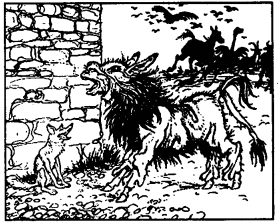
The idea of creating fear amongst the animals of the forest amused the Ass. The Ass donned on the Lion’s skin and hid himself in the thick bushes. As any animal passed by he suddenly came rushing out at the animal and scared it a way. All the animals of the jungle developed great dread of him. He felt really delighted to know that. He got so overwhelmed with joy that he couldnot contain his happiness. He started giving out a loud harsh bray. A fox who was running with other animals to escape from the Ass suddenly stopped short. He laughed at the Ass and told him that if he had not been stupid to give out a bray of an Ass, he could have saved himself from a lot of trouble. Soon all other animals gathered around him and beat him black and blue.
(2) The Fox and The Crow:
Once a crow found a piece of meat. He was very happy to find the piece of meat as he was feeling extremely hungry. He flew and perched on a thick branch of a tree to enjoy his meal. A fox who was wandering here and there in search of food saw the crow sitting on the tree with the piece of meat. He wanted to get that piece of meat from him, so he thought of a plan. He started praising the crow that he had heard that the crow had a very melodius voice. He requested the crow to sing a song for him in his beautiful voice.
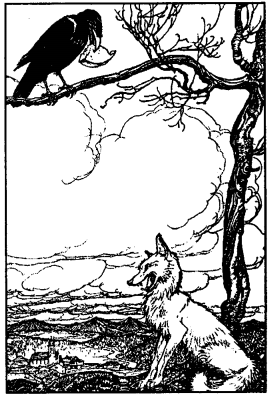
The crow felt very pleased to hear the clever fox’s words. He immediately opened his beak to sing. As soon as he did that the piece of meat that he held in his beak fell down. The fox quickly picked it an gobbled it up. The poor crow had to go hungry due to his foolishness.
(3) The Wolf and The Crane:
Once upon a time there lived a clever wolf in a jungle. One day a thick piece of bone of his prey, that he had devoured, got stuck in his mouth. The wolf was in great pain. He felt extremely uncomfortable and grew restless on account of the excruciating pain.
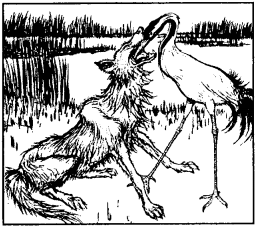
He started crying for help from his fellow animals. Suddenly he came across a crane who was wading in the waters of a river nearby. He asked for help from the crane. The crane agreed to help the wolf on one condition. She asked the wolf to give her a reward in return of her help. The wolf quickly agreed to the crane’s proposal. The crane very easily moved her long neck down the wolf, mouth and with her sharp beak took out the piece of bone. The wolf got relieved of his pain. The crane then asked for her reward. The clever wolf said to the crane that she had already got her reward as she had successfully took out her neck from a wolfs mouth. The crane was full of regret for helping the clever wolf.
(4) The Turtle Who Could Not Stop Talking:
Once upon a time there lived a Turtle in a river in a forest. Due to extremely hot weather the river, soon, started running dry. All aquatic life in that river started getting seriously affected. The fishes, the plants, the phytoplanktons were dying. The turtle called out his close friends who were the two geese that lived in a river few kilometres away. The turtle requested his friends to take him away with them to their dwelling. His friends agreed to the Turtle’s request. They picked a thick branch of a tree from the ground. Both of them held it from its two ends
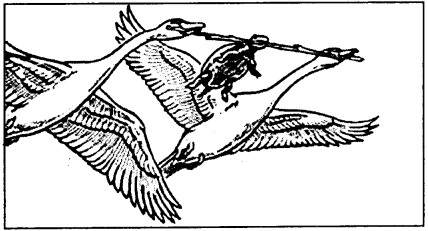
in their beak. They asked the turtle to hold the branch in his mouth from its centre. The turtle did what the geese said. The geese told the turtle that he must not open his mouth while they fly in the air. As the three of them moved through the air, a bunch of naughty boys, who were playing on the ground started making fun of the turtle. They mocked at the Turtle and laughed at the funny sight. The Turtle got irked and to defend himself opened his mouth. His grip on the wooden branch got loose, he fell on the ground ‘and lost his life.
(5) The Cock and the Cat:
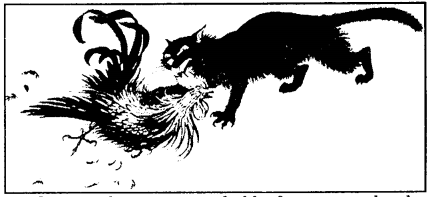
Once a clever cat got hold of a poor cock who was feeding on the grains of corn lying on the ground. The cat held the cock from his neck with his sharp paws. He said to the cock “every morning you disturb the sleep of thousands of people with your sharp loud crow. You must be punished for your bad deeds.” The cock at once said to the cat that he crows early morning only for the benefit of humanity. He wakes them up from their sleep so that they can get on with their day’s work and don’t miss the important task. The wicked cat was determined to eat the cock to satiate his hunger. He said to the cock “you abound in apologies but its breakfast time.” He instantly killed the bird and ate him up.
(6) The Goose That Laid The Golden Egg:
There lived a farmer, with his wife, in a cottage. They had a golden goose that laid a golden egg everyday. The farmer and his wife were very pleased and happy with their life. They would sell the golden eggs and get a huge sum in return. They soon started making a lot of money. One day the farmer and his wife had a discussion with each other. They decided to kill the golden goose.
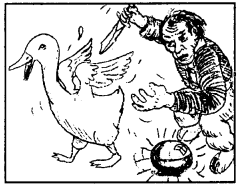
They thought to themselves that a goose laying a golden egg everyday must contain great gold lump in its belly. Instead of waiting everyday for just a single golden egg it’s better to cut the goose up and get all the gold at once. They killed the goose. Due to their greed they had to part with their golden goose who gave them riches and joy.
(7) The Crane and The Crab:
Once upon a time there lived a crane near a pond. He had grown old and debilitated. Due to his old age it had become extremely difficult for him to make arrangement for his food. He saw the pond teeming with all sorts of aquatic life including the fishes, crabs, prawns, etc. He thought of a clever idea to feast on the pond dwellers. He sat down near the pond with a sad face. When all the pond animals saw him sitting with a sad face they got curious to know the cause of his sadness. When they inquired him about the same he said that an Astrologer had made a prediction that this pond would soon run dry. All the animals got worried and disappointed to know that. They started discussing amongst themselves as to what could be done to improve the situation.
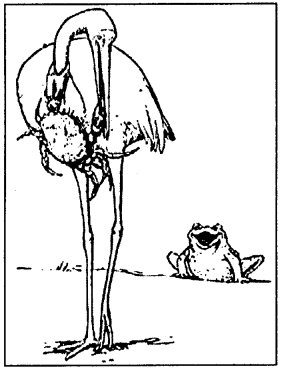
They all decided to go to the crane to ask for a solution to their problem. The Crane replied that he could help them. He would take all the animals, one by one, in his beak, to the other pond. All the animals agreed to his plan. The clever crane would pick up one animal daily in his beak to be taken to a deserted place. There he would devour his prey to pieces. One day it was the Crab’s turn. The Crane held the Crab in his beak and flew away on his way to the deserted place. As the Crane was about to reach his destination, the Crab saw the skeletons of the fishes on the rocks below, he immediately sensed the danger and realised that the Crane had brought him there to kill and eat him up like the other animals. He quickly caught hold of his neck with his sharp pincers and crushed him to death.
(8) The Monkey and The Crocodile:
Once upon a time there lived a monkey on a rose apple tree which was situated near the bank of a river. In the river lived a crocodile. To satiate his hunger, the monkey would pluck the rose apples and eat them up. He would also give some of them to the crocodile. Soon the monkey and the crocodile became very good friends. They started spending a lot of time in each other’s company. The crocodile started reaching his home late on daily basis. The crocodile’s wife got really annoyed due to the crocodile’s neglect of duty towards his family. She inquired from the crocodile the reason for his coming home late. The crocodile told his wife about his new friend and even gave her some rose apples, which the monkey had sent for the crocodile’s wife. The Crocodile’s wife found the fruits very delicious and said to her husband “the fruits are so tasty and sweet.
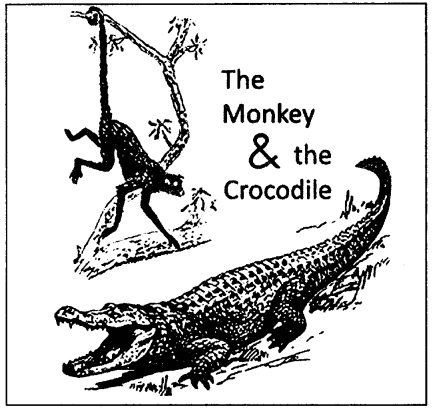
The heart of the monkey, who had been eating them daily, must have become really delicious and sweet.” She immediately demanded her husband to bring the monkey along with him so that she could feast on him. The crocodile refused to do so. His wife thought of a clever idea. She lied down on the bed and pretended to be sick. She told her husband that the doctor had said that her condition was critical and she could only get well if she ate a monkey’s heart. The crocodile was in great dilemma. He could not sacrifice his friend’s life for his wife. The crocodile’s wife appealed to his husband’s conscience by reminding him of his responsibilities towards his wife.
The crocodile went near the tree and told the monkey that his wife had invited him for the dinner. The monkey agreed to go with the crocodile to his place. On their way, the crocodile told the monkey that he was taking him to his house not for any dinner but for his wife who wanted to eat his heart. The monkey didn’t take a minute to think of an idea to save his life. He said to the crocodile that he had left his heart on the tree. If he had been told that his wife wanted to eat his heart, he would have brought it along with him. The crocodile asked the monkey to bring back his heart and took a turn to go towards the tree. On reaching near the tree, the monkey quickly made a huge leap to reach his home on the tree. He then said to the Crocodile that he must tell his wife that she had married a fool.
Words and Expressions Class 10 Solutions
Class 10 English Main Course Book
Unit 1 Health and Medicine
Unit 2 Education
Unit 3 Science
Unit 4 Environment
Unit 5 Travel and Tourism
Unit 6 National Integration
Class 10 English Workbook
- Unit 1 Determiners
- Unit 2 Tenses
- Integrated Grammar Practice 1
- Integrated Grammar Practice 2
- Unit 5 Relatives
- Unit 6 Connectors
- Integrated Grammar Practice 3
- Unit 7 Conditionals
- Integrated Grammar Practice 4
- Unit 9 Avoiding Repetition
- Unit 10 Nominalisation
- Integrated Grammar Practice 5
- Unit 11 Modals-Expressing Attitudes
- Integrated Grammar Practice 6
- Unit 12 Active and Passive
- Integrated Grammar Practice 7
- Integrated Grammar Practice 8
- Unit 14 Prepositions
- Integrated Grammar Practice 9